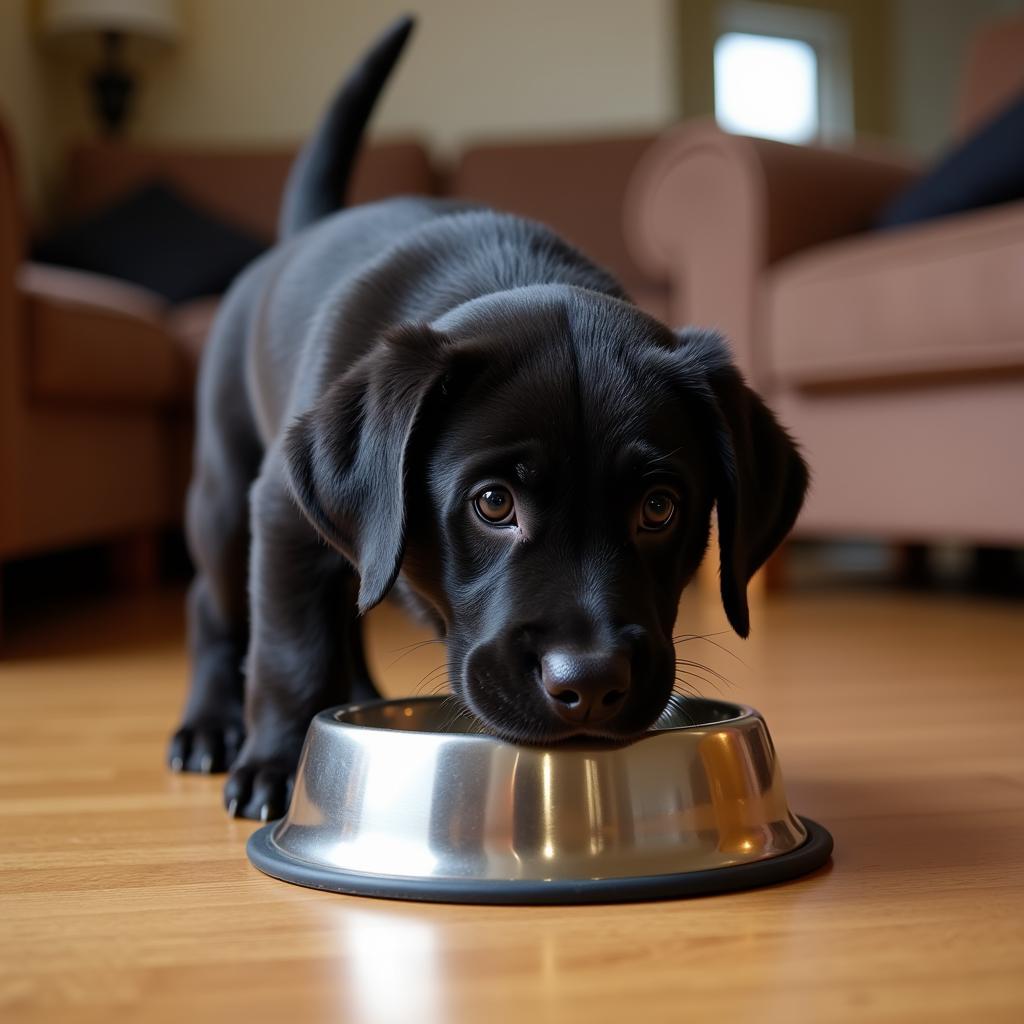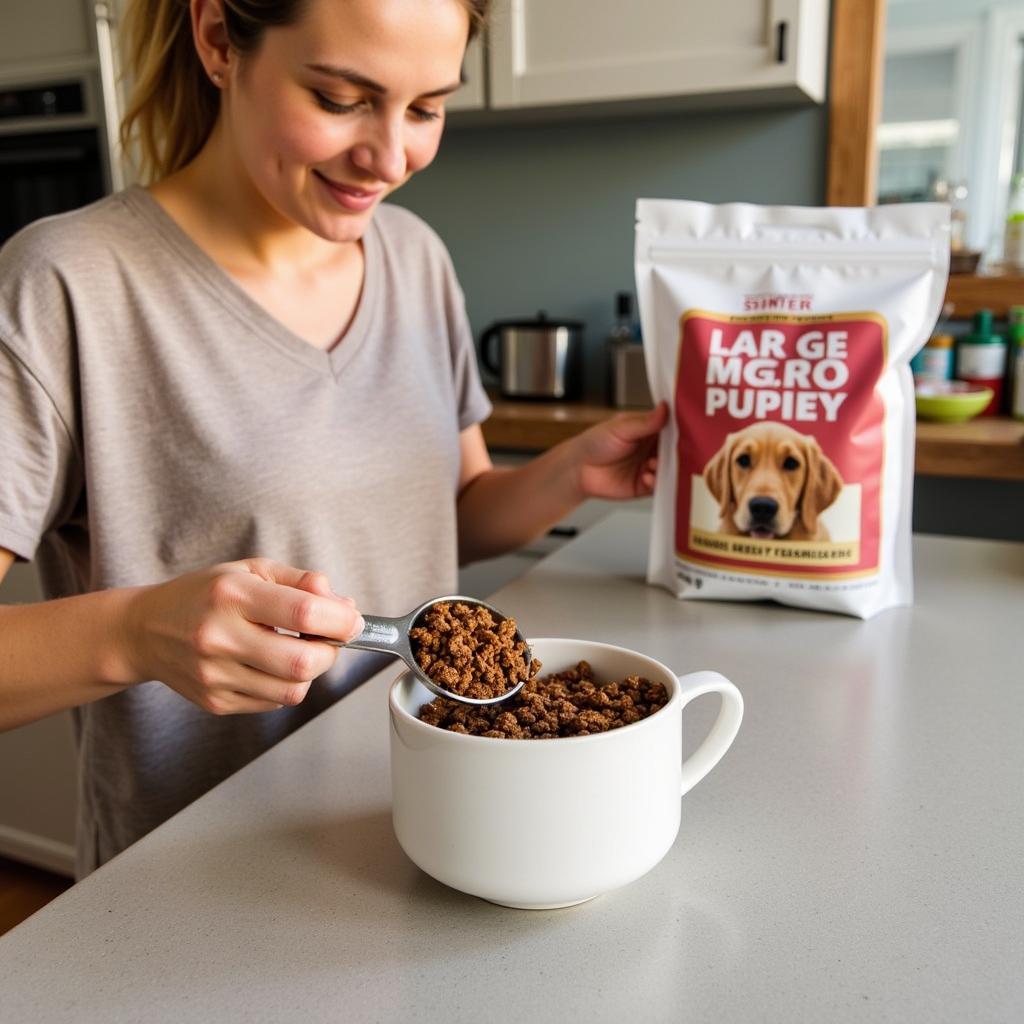Finding the Best Puppy Food For Labrador Retrievers is crucial for their growth, development, and overall well-being. These energetic and playful pups have specific nutritional needs to support their active lifestyles. This comprehensive guide will explore the top food choices to help your Labrador puppy thrive.
Understanding the Nutritional Needs of Labrador Puppies
Labrador Retrievers, known for their playful nature and boundless energy, require a diet rich in protein, fat, and essential nutrients. Their rapid growth phase demands a higher calorie intake compared to smaller breeds.
Here’s a closer look at the key nutrients your Labrador puppy needs:
- Protein: Essential for muscle development and growth. Look for puppy food with high-quality protein sources like chicken, fish, or lamb.
- Fat: Provides energy and supports brain development. Choose foods with healthy fats like omega-3 and omega-6 fatty acids.
- Carbohydrates: Offer a source of energy and fiber. Opt for complex carbohydrates found in whole grains like brown rice or oatmeal.
- Calcium and Phosphorus: Vital for strong bones and teeth. Ensure the food has a balanced calcium-to-phosphorus ratio.
- DHA (Docosahexaenoic Acid): An omega-3 fatty acid crucial for brain and vision development. Look for foods with DHA-rich ingredients like fish oil.
Choosing the Right Puppy Food for Your Labrador Retriever
With numerous puppy food options available, selecting the right one can be overwhelming. Consider these factors when making your decision:
Age
Labrador puppies have different dietary needs at different life stages. Choose a puppy food specifically formulated for their age:
- Up to 6 Months: Opt for a high-calorie puppy food designed for large breed puppies.
- 6-12 Months: Gradually transition to a large breed puppy food with slightly lower calorie content.
Activity Level
Consider your Labrador puppy’s activity level. Highly active pups may require more calories than less active ones.
Brand Reputation and Quality
Choose reputable brands known for producing high-quality pet food. Look for brands that use premium ingredients and have rigorous quality control measures in place.
Ingredients
Always read the ingredient list carefully. The first few ingredients should be high-quality protein sources. Avoid foods with artificial colors, flavors, and preservatives.
Budget
Puppy food prices can vary widely. Determine your budget and look for the best quality food within your price range. Remember, investing in good nutrition now can save you vet bills later.
 Labrador Retriever puppy enjoying its meal
Labrador Retriever puppy enjoying its meal
Top Puppy Food Choices for Labrador Retrievers
Here are some of the top-rated puppy food options for Labrador Retrievers:
1. Royal Canin Labrador Retriever Puppy Food
Specifically formulated for Labrador puppies up to 15 months old, this food supports healthy bone and joint development. It contains a blend of antioxidants to support the immune system.
2. Blue Buffalo Life Protection Formula Large Breed Puppy Food
This food features high-quality protein from deboned chicken, along with whole grains and vegetables. It also includes Blue Buffalo’s LifeSource Bits, a blend of antioxidants, vitamins, and minerals.
3. Purina Pro Plan Large Breed Puppy Formula
This formula is designed to promote controlled growth and help prevent joint issues common in large breeds. It’s rich in protein and essential nutrients to support your puppy’s overall health.
4. Hill’s Science Diet Large Breed Puppy Food
Made with high-quality ingredients and formulated for optimal nutrient absorption, this food supports healthy growth and development. It also promotes healthy skin and a shiny coat.
5. Eukanuba Large Breed Puppy Food
This food features high-quality protein and calcium to support bone and joint health in large breed puppies. It also contains DHA for brain development.
 Measuring the right amount of food for a Labrador Retriever puppy
Measuring the right amount of food for a Labrador Retriever puppy
Feeding Guide for Labrador Retriever Puppies
Follow these feeding guidelines to ensure your Labrador puppy receives the right amount of food:
- Frequency: Feed your puppy 3-4 times a day until they are six months old. Then, gradually reduce to 2 meals per day.
- Quantity: Refer to the feeding guide on your chosen puppy food packaging. Adjust the amount based on your puppy’s age, activity level, and metabolism.
- Water: Always provide access to fresh, clean water.
Common Feeding Issues in Labrador Puppies
Labrador Retrievers are prone to certain feeding issues, including:
- Bloat: This is a life-threatening condition that can occur when a dog’s stomach fills with gas and twists. To prevent bloat, feed your puppy smaller, more frequent meals and avoid strenuous exercise after eating.
- Obesity: Labs are prone to overeating. Monitor their weight closely and adjust their food intake accordingly.
- Food Allergies: Some Labs may develop food allergies. If you notice any signs of allergies, such as itching, vomiting, or diarrhea, consult your veterinarian.
Tips for a Smooth Transition to New Puppy Food
When switching your Labrador puppy to a new food, follow these tips to avoid digestive upset:
- Gradual Transition: Mix the new food with the old food, gradually increasing the ratio of new food over 7-10 days.
- Monitor Stool: Keep an eye on your puppy’s stool for any changes in consistency or frequency.
- Consult Your Vet: If you have any concerns about your puppy’s diet or digestion, consult your veterinarian.
Conclusion
Choosing the best puppy food for your Labrador Retriever is essential for their long-term health and well-being. By understanding their nutritional needs, considering important factors, and selecting from reputable brands, you can provide your furry friend with the nourishment they need to thrive. Remember to consult your veterinarian for personalized feeding recommendations based on your puppy’s individual needs.
FAQs
1. How much food should I feed my Labrador puppy?
The amount of food your Labrador puppy needs will vary depending on their age, activity level, and metabolism. Always refer to the feeding guide on your chosen puppy food packaging and consult with your veterinarian for personalized recommendations.
2. Can I give my Labrador puppy human food?
While it’s tempting to share your food with your furry friend, some human foods can be toxic to dogs. Avoid feeding your puppy grapes, raisins, onions, chocolate, and anything high in fat or sugar.
3. When should I switch my Labrador puppy from puppy food to adult food?
Most Labrador Retrievers can transition to adult food around 12-18 months of age. However, consult with your veterinarian for the best timing based on your puppy’s individual growth and development.
4. What are the signs of a food allergy in a Labrador puppy?
Common signs of food allergies in puppies include itching, skin rashes, vomiting, diarrhea, ear infections, and excessive licking or scratching. If you notice any of these symptoms, consult your veterinarian.
5. How can I prevent my Labrador puppy from becoming overweight?
Monitor your puppy’s weight closely, feed them a balanced diet, provide plenty of exercise, and avoid giving them too many treats.
6. What should I do if my Labrador puppy refuses to eat their new food?
Try warming up the food slightly, mixing in a small amount of wet food, or adding a topper like cooked chicken or fish. If your puppy continues to refuse to eat, consult your veterinarian to rule out any underlying medical conditions.
7. Can I give my Labrador puppy supplements?
While a balanced diet should provide all the nutrients your puppy needs, you may consider adding supplements in consultation with your veterinarian.
Need More Help?
For any assistance related to dry food dispensers or other pet-related needs, feel free to reach out to us:
- Phone: 02437655121
- Email: minacones@gmail.com
- Address: 3PGH+8R9, ĐT70A, thôn Trung, Bắc Từ Liêm, Hà Nội, Việt Nam
Our dedicated customer support team is available 24/7 to assist you.